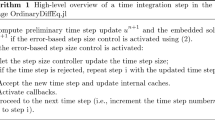Abstract
We present an adaptive time stepping technique, based on a dual-time stepping scheme together with a RK/implicit smoother for physical time marching. This method is found to be very efficient for transient problem characterized by a large variations of time scales during the physical time and hence a wide range of required physical time steps. We discuss the method and present several examples of compressible flow problems.
















Similar content being viewed by others
References
Chiew, J. J., Pulliam, T. H.: Stability analysis of dual-time stepping. In: 46th AIAA Fluid Dynamics Conference (2016)
Darmofal, D., Van Leer, B.: Local preconditioning: manipulating mother nature to fool father time. In: Caughey, D.A., Hafez, M. (eds.) Advances and Prospects in Computational Aerodynamics, Computing the Future II. John Wiley and Sons (1998)
de Brito Alves, L. S.: Dual time stepping with multi-stage schemes in physical time for usteady low Mach number compressible flows. EPTT-VII Escola de Primavera de TransiÃğÃčo e TurbulÃłncia (2010)
Eliasson, P., Weinerfelt, P.: High-order implicit time integration for unsteady turbulent flow simulations. Comput. Fluids 112, 35–49 (2015)
Gustafsson, K., Lundh, M., Sűderlind, G.: A pi stepsize control for the numerical solution of ordinary differential equations. BIT Numer. Math. 28(2), 270–287 (1988)
Haas, J.F., Sturtevant, B.: Interaction of weak shock waves with cylindrical and spherical gas inhomogenities. J. Fluid Mech. 181, 41–76 (1987)
Hay, A., Etienne, S., Pelletier, D., Garon, A.: hp-Adaptive time integration based on the BDF for viscous flows. J. Comput. Phys. 291, 151–176 (2015)
Jameson, A.: Time dependent calculations using multigrid, with applications to unsteady flows past airfoils and wings. AIAA paper, p. 1596 (1991)
Jameson, A.: Evaluation of fully implicit Runge Kutta schemes for unsteady flow calculations. J. Sci. Comput. 73, 1–34 (2017)
Jameson, A., Schmidt, W., Turkel, E.: Numerical solutions of the Euler equations by finite volume methods using Runge–Kutta time-stepping schemes. AIAA paper, 1259 (1981)
John, V., Rang, J.: Adaptive time step control for the incompressible Navier–Stokes equations. Comput. Methods Appl. Mech. Eng. 199, 514–524 (2010)
Kennedy, C.A., Carpenter, M.H.: Additive Runge–Kutta schemes for convection–diffusion–reaction equations. Appl. Numer. Math. 44(1), 139–181 (2003)
Langer, S.: Accuracy investigations of a compressible second order finite volume code towards the compressible limit. Comput. Fluids 149, 110–137 (2017)
Langer, S.: Agglomeration multigrid methods with implicit Runge–Kutta smoothers applied to aerodynamic simulations on unstructured grids. J. Comput. Phys. 277, 72–100 (2014)
Peles, O., Yaniv, S., Turkel, E.: Convergence Acceleration of Runge–Kutta Schemes using RK/implicit smoother for Navier–Stokes equations with SST turbulence. In: Proceedings of 52nd Israel Annual Conference on Aerospace Sciences (2012)
Peles, O., Turkel, E., Yaniv, S.: Fast Iterative methods for Navier–Stokes equations with SST turbulence model and chemistry (ICCFD7). In: Seventh International Conference on Computational Fluid Dynamics (2012)
Peles, O., Turkel, E.: Acceleration methods for multi-physics compressible flow. J. Comput. Phys. 358, 201–234 (2018)
Rossow, C.C.: Efficient computation of compressible and incompressible flows. J. Comput. Phys. 220(2), 879–899 (2007)
Shi, J., Zhang, Y.T., Shu, C.W.: Resolution of high order WENO schemes for complicated flow structures. J. Comput. Phys. 186), 690–696 (2003)
Shu, C.W., Osher, S.: Efficient implementation of essentially non-oscillatory shock-capturing schemes. J. Comput. Phys. 83(1), 32–78 (1989)
Sod, G.: A survey of several finite difference methods for systems of nonlinear hyperbolic conservation laws. J. Comput. Phys. 27(1), 1–31 (1978)
Swanson, R.C., Rossow, C.C.: An efficient solver for the RANS Equations and a one-equation turbulence model Comput. Fluids 42, 13–25 (2011)
Swanson, R.C., Rossow, C.C., Yaniv, S.: Analysis of a RK/implicit smoother for multigrid, computational fluid dynamics. In: Kuzmin, A. (Ed.) The Sixth International Conference on Computational Fluid Dynamics. Springer, St. Petersburg, Russia, July 12–16 (2010)
Swanson, R.C., Turkel, E.: Analysis of a fast iterative method in a dual time algorithm for the Navier–Stokes equations. In: European Congress on Computational Methods in Applied Sciences and Engineering (ECCOMAS 2012), Vienna, Austria, September 10–14, 2012
Swanson, R.C., Turkel, E., Rossow, C.C.: Convergence acceleration of Runge–Kutta schemes for solving the Navier–Stokes equations. J. Comput. Phys. 224(1), 365–388 (2007)
Turkel, E.: Preconditioned methods for solving the incompressible and low speed compressible equations. J. Comput. Phys. 72(2), 277–298 (1987)
Turkel, E.: Review of preconditioning methods for fluid dynamics. Appl. Numer. Math. 12, 257–284 (1993)
Turkel, E., Fiterman, A., Van Leer, B.: Preconditioning and the limit to the incompressible flow equations. In: Caughey, D.A., Hafez, M.M. (eds.) Frontiers of Computational Fluid Dynamics, pp. 215–234. Wiley, New York (1994)
Turkel, E., Radespiel, R., Kroll, N.: Assessment of preconditioning methods for multidimensional aerodynamics. Comput. Fluids 26(2), 613–634 (1997)
Turkel, E., Vatsa, V.N.: Choice of variables and preconditioning for time dependent problems. AIAA paper, 3692 (2003)
Turkel, E., Vatsa, V.N.: Local preconditioners for steady state and dual time stepping. ESAIM: M2AN 39(3), 515–536 (2005)
Van Leer, B., Lee, W., Roe, P.: Characteristic time-stepping or local preconditioning of the Euler equations. In: 10th Computational Fluid Dynamics Conference (1991)
Van Leer, B., Lee, E.T., Roe, P.L., Powell, K.G., Tai, C.H.: Design of optimally smoothing multi-stage schemes for the Euler equations. Commun. Appl. Numer. Methods 8(10), 761–769 (1992)
Wang, B.S., Li, P., Gao, Z., Don, W.S.: An improved fifth order alternative WENO-Z finite difference scheme for hyperbolic conservation laws. J. Comput. Phys. 374, 469–477 (2018)
Xu, Z., Shu, C.W.: Anti-diffusive flux corrections for high order finite difference WENO schemes. J. Comput. Phys. 205, 458–485 (2005)
Zhao, G., Sun, M., Xie, S., Wang, H.: Numerical dissipation control in an adaptive WCNS with a new smoothness indicator. Appl. Math. Comput. 330, 239–253 (2018)
Author information
Authors and Affiliations
Corresponding author
Additional information
We dedicate this paper to the memory of Saul (Shalom) Abarbanel who was a mentor to whole generation of students and colleagues.
Publisher's Note
Springer Nature remains neutral with regard to jurisdictional claims in published maps and institutional affiliations.
Rights and permissions
About this article
Cite this article
Peles, O., Turkel, E. Adaptive Time Steps for Compressible Flows Based on Dual-Time Stepping and a RK/Implicit Smoother. J Sci Comput 81, 1409–1428 (2019). https://doi.org/10.1007/s10915-019-01024-y
Received:
Revised:
Accepted:
Published:
Issue Date:
DOI: https://doi.org/10.1007/s10915-019-01024-y




